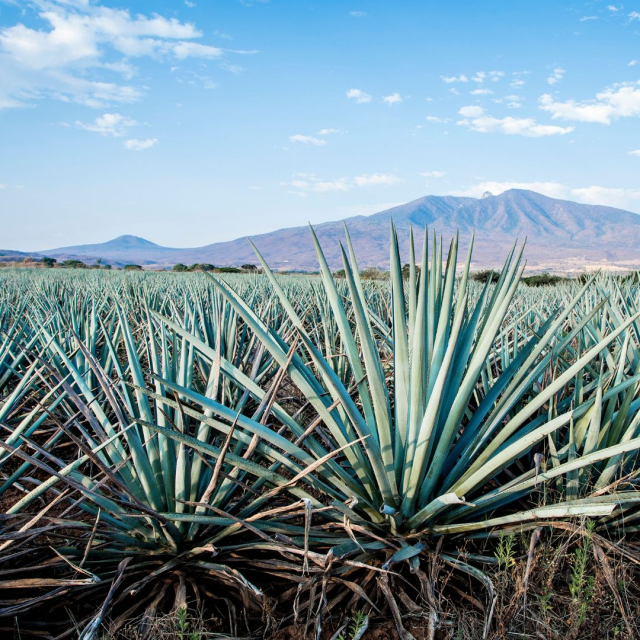Tequila is a distilled alcoholic beverage that has achieved worldwide fame, not only for its distinctive flavor, but also for its deep connection to the culture and identity of Mexico. Its production is a meticulous process that involves traditional techniques and knowledge passed down through generations.
Origin and History of Tequila
Tequila has its roots in a pre-Hispanic drink called "pulque," which indigenous Mexicans produced from the fermentation of agave juice. With the arrival of the Spanish and the introduction of distillation techniques in the 16th century, pulque evolved into what we know today as tequila. The Tequila region, in the state of Jalisco, became the epicenter of this production due to its climatic conditions and ideal soils for growing agave.
The Agave Plant
Types of Agave
Tequila is produced exclusively from the blue agave (Agave tequilana Weber var. azul). This plant, belonging to the succulent family, is characterized by its long pointed leaves and its ability to store large amounts of water, which allows it to survive in arid climates.
Agave cultivation
The agave cultivation process is essential for the quality of tequila. From the planting of the suckers (shoots of the mother plant) until maturity, between 7 and 10 years can pass. During this time, the plants are meticulously cared for, making sure they receive the proper amount of sun and water.
The jimadores, workers specialized in the cultivation and harvesting of agave, play a crucial role. They select the mature plants and use a tool called a "coa" to cut the leaves and extract the "piña" or heart of the agave, which is the part used to produce tequila.
Tequila Production Process
Agave Cooking
Once harvested, the agave piñas are taken to distilleries where they are cooked to convert the starches into fermentable sugars. Traditionally, this was done in stone ovens, but today many producers use stainless steel autoclaves which allow for faster and more efficient cooking.
Grinding
After cooking, the pineapples are crushed to extract the sweet juice known as "must." This process can be carried out using mechanical mills or the tahona, a stone wheel that crushes the pineapples in a more traditional way. The choice of method can influence the flavor profile of the final tequila.
Fermentation
The must is placed in large fermentation tanks, where water and yeast are added. During this process, sugars are converted to alcohol. Fermentation can last between 3 and 12 days, depending on temperature and other environmental factors. Some distilleries opt for longer fermentations to develop more complex flavors.
Distillation
The fermented liquid, known as "dead wort," undergoes double distillation in copper or stainless steel stills. The first distillation, called "shattering," produces a low-alcohol liquid. The second distillation, known as "rectification", further refines the product, increasing its alcoholic concentration and removing impurities.
Aging
Not all tequilas are aged, but those that are develop unique flavors and characteristics. There are three main categories of aged tequila:
Blanco Tequila: It is bottled immediately after distillation or left to rest for up to 60 days. It has a pure and fresh agave flavor.
Reposado Tequila: It is aged between 2 months and 1 year in oak barrels, acquiring softer and more complex flavors.
Añejo Tequila: It is aged between 1 and 3 years in oak barrels, developing a deep and sophisticated flavor profile.
Extra Añejo Tequila: It is aged for more than 3 years, reaching an exceptional level of complexity and richness.
Bottling
Finally, the tequila is filtered and bottled. Each bottle must comply with the standards established by the Tequila Regulatory Council (CRT), which guarantees the authenticity and quality of the product. Bottles are usually labeled with information about the type of tequila, the producer, and the region of origin.
Cultural and Economic Impact
Tequila is not just a drink; It is a symbol of Mexican culture and an important economic engine for the country. The tequila industry generates thousands of jobs, from the cultivation of agave to international marketing. Additionally, tourism in tequila regions, such as Jalisco, attracts visitors from all over the world who want to learn more about this iconic drink.
Appellation of origin
Tequila is one of the few drinks in the world with a Denomination of Origin, which means that it can only be produced in certain regions of Mexico, following specific methods. The main production areas include Jalisco, Nayarit, Tamaulipas, Michoacán and Guanajuato. This designation protects the quality and authenticity of tequila, ensuring that only drinks produced under these strict standards can bear the tequila name.
Current Innovations and Trends
Although tequila is based on centuries-old traditions, the industry has seen numerous innovations and trends in recent years. Some of the most notable ones include:
Organic and Artisanal Tequilas
Interest in organic products and sustainable production methods has led to an increase in the production of organic tequilas. These tequilas are made without the use of pesticides or chemical fertilizers, and are often produced in small distilleries that prioritize quality over quantity.
International expantion
The international tequila market continues to grow, with growing demand in countries such as the United States, Canada and Europe. This expansion has led Mexican distilleries to increase their production capacity and adapt to different tastes and preferences of global consumers.
New Aging Techniques
Some distilleries are experimenting with unconventional aging techniques, such as using barrels that previously held other types of spirits (such as whiskey or wine), to impart new flavors and characteristics to tequila.
Tequila is not just an alcoholic beverage; It is a manifestation of the identity and cultural heritage of Mexico. The next time you enjoy a sip of tequila, you'll be savoring centuries of history, tradition and dedication.
